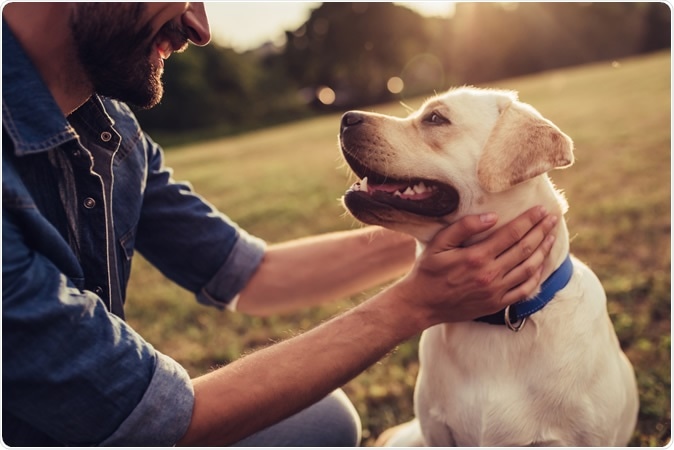Can dogs and other pets play a role in the transmission of the novel coronavirus? The question has surfaced after a Pomeranian in Hong Kong tested positive for the SARS-CoV-2 or the novel coronavirus last week.

Image Credit: 4 PM production / Shutterstock
What happened?
After the pet dog tested positive for the virus, there has been a scramble to find out if dogs could play a role in the transmission of the Severe Acute Respiratory Syndrome Coronavirus 2 or SARS-CoV-2. According to a statement from the Agriculture, Fisheries and Conservation Department (AFCD), Hong Kong, “The dog has a low-level of infection, and it is likely to be a case of human-to-animal transmission. We strongly advise that mammalian pet animals, including dogs and cats, from households with infected persons, should be put under quarantine to safeguard public and animal health.” They explained that the dog was “weakly positive.”
Experts say
According to one of the experts, Shelley Rankin, a microbiologist at the University of Pennsylvania School of Veterinary Medicine, Philadelphia, who spoke to Science, there is no present evidence to suggest that there is a possibility of spread from humans to animals or vice versa. She said that the dog had a small amount of the virus in the samples from its nasopharyngeal secretions. She highlighted that this was a single case and there needs to be better understanding before conclusions are drawn.
Rankin, whose lab is part of the U.S. Food and Drug Administration’s (FDA) Veterinary Laboratory Investigation and Response Network, added that since cats and dogs are also mammals, they also have some of the receptors which may bind to the virus. But if they could actually get the infection is still a question.
At present, recommendations remain that those who are ill with SARS-CoV-19 should avoid contact with pet animals and also wash hands after touching them. She also said that there are no recommendations at present to test pets for COVID-19. However, if they are infected, they may become reservoirs for infection she added and thus could spread the disease. This would mean that infected pets would need to be quarantined and isolated. Those animals that have come in contact with a sick person also need to be isolated and observed. To avoid the animals from getting infected, they should also be kept home as much as possible, she said.
Health organizations say
The World Health Organisation (WHO) issued updated information yesterday, 13th of March 2020, saying, “...at present there is no evidence that companion animals/pets such as dogs or cats can be infected with the new coronavirus.” World Organisation for Animal Health has also said, “...there is no justification in taking measures against companion animals which may compromise their welfare.” The Centers for Disease Control and Prevention (CDC) also says, “there is no reason to think that any animals including pets in the United States might be a source of infection with this new coronavirus.”
Key recommendations from the CDC
The CDC, along with the U. S. Department of Agriculture (USDA) and the U.S. Fish and Wildlife Service (FWS), has listed out recommendations for prevention and control of infection of and from animals to humans. The CDC is in charge of the removal of animals as well as animal products that could harm humans.
- Some forms of coronaviruses are capable of infecting animals as well as humans. Thus care should be taken to keep sick persons with COVID-19 away from animals and pets.
- The source of the current pandemic is unknown and could be from wild animals. However, it is not known if pets are capable of spreading Covid-19.
- There may be a risk of getting the infection from imported pets or animal products. However, the CDC assures that there is no such risk in the United States.
- The CDC and the WHO recommends that irrespective of the status of the animals – pets, livestock or wild animals, hygiene rules remain the same. The WHO says, “It is always a good idea to wash your hands with soap and water after contact with pets. This protects you against various common bacteria such as E.coli and Salmonella that can pass between pets and humans.” Some of the recommendations include –
- Washing hands thoroughly with soap and water after handling animals, their food supplies or their waste matter.
- Good pet hygiene should be followed, and pets should be kept clean
- Pets need to be taken to the veterinarian regularly for health check-ups.
- Mouth and nose should be covered with a tissue or elbow while coughing or sneezing, and the tissues should be disposed of in a closed bin.
- At least one-meter distance needs to be maintained from persons who are coughing or sneezing.
- Those who are sick with COVID-19 should have no contact with pets the CDC website advises. This way, both the pets and the owners would be protected. When one is sick, the pets should be cared for by another person.
- Physical contact with pets, including petting, hugging, kissing, sharing food, being licked, should be avoided. After handling pets, hands should be washed with soap and water.